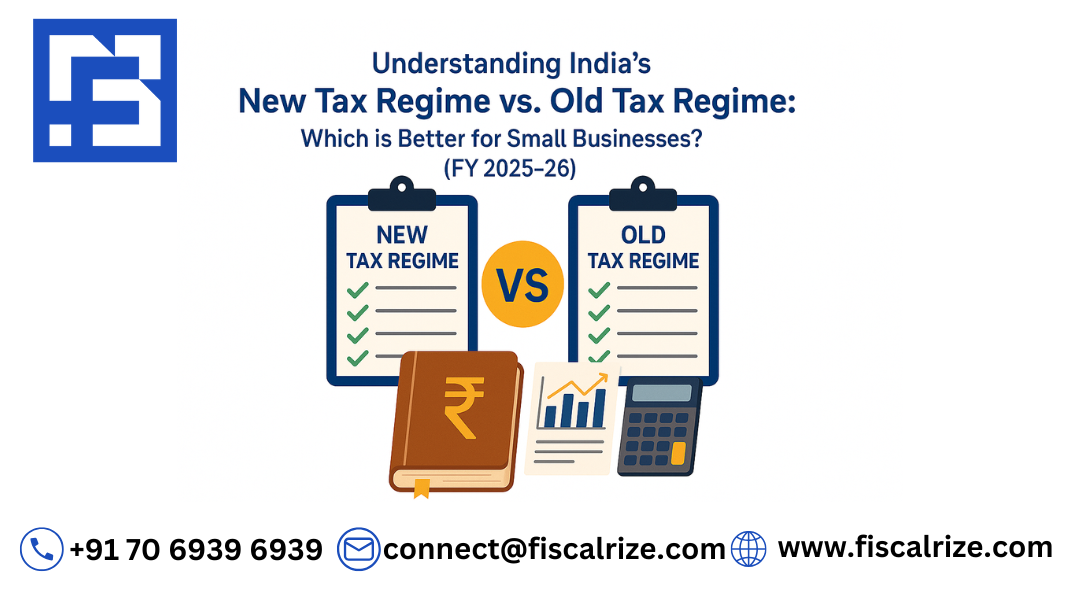Understanding India’s New Tax Regime vs. Old Tax Regime: Which is Better for Small Businesses? (FY 2025-26)

Introduction
For entrepreneurs and small business owners in India, tax planning can be both daunting and crucial. With two income tax regimes available—the Old Tax Regime and the New Tax Regime—it’s natural to wonder: Which one should you choose? This guide will help you understand the differences, advantages, and how to decide which regime suits your business best for FY 2025-26.
What are the Old and New Tax Regimes?
Old Tax Regime
The Old Tax Regime has been the default for years. It offers a range of exemptions and deductions—like HRA, Section 80C (investments), 80D (health insurance), and others. Taxpayers could lower their taxable income by smart planning and investments.
New Tax Regime
Introduced in FY 2020-21, the New Tax Regime offers lower slab rates but removes most exemptions and deductions. It aims to simplify the process and give more flexibility, especially to those who don’t claim many deductions.
Latest Income Tax Slabs for FY 2025-26
New Tax Regime (Default for Individuals & HUFs)
| Income Slab | Income Tax Rate |
|---|---|
| Up to ₹3,00,000 | Nil |
| ₹3,00,001 – ₹6,00,000 | 5% |
| ₹6,00,001 – ₹9,00,000 | 10% |
| ₹9,00,001 – ₹12,00,000 | 15% |
| ₹12,00,001 – ₹15,00,000 | 20% |
| Above ₹15,00,000 | 30% |
No major deductions allowed (except for NPS employer contribution, section 80CCD(2), and standard deduction of ₹50,000 for salaried individuals in Budget 2024-25).
Old Tax Regime (With Deductions & Exemptions)
| Income Slab | Income Tax Rate |
|---|---|
| Up to ₹2,50,000 | Nil |
| ₹2,50,001 – ₹5,00,000 | 5% |
| ₹5,00,001 – ₹10,00,000 | 20% |
| Above ₹10,00,000 | 30% |
Deductions available under 80C, 80D, HRA, LTA, etc.
Key Differences: Old vs. New Tax Regime
| Feature | Old Regime | New Regime |
|---|---|---|
| Tax Rates | Higher | Lower |
| Deductions/Exemptions | Yes (Multiple) | Mostly Not Allowed |
| Standard Deduction | Yes | Yes (from FY 2023-24 onwards) |
| Suitable for | High investments/expenses | Minimal deductions/straightforward |
How to Choose the Right Regime for Your Small Business
1. Evaluate Your Deductions
- Do you claim significant deductions—like investments (80C), insurance (80D), home loan interest, HRA?
- YES: Old regime may save you more.
- NO: New regime’s lower rates may benefit you.
2. Salary Structure
- If your salary includes components like HRA, LTA, etc., the old regime may offer more tax savings.
- For simple salary structures or freelancers without many claims, new regime is easier.
3. Business Owners/Proprietors
- If you operate as a sole proprietorship or partnership, both regimes apply. Calculate under both before finalizing.
4. Corporate Structures (Companies/LLPs)
- These regimes do not apply; different corporate tax rates and rules exist.
Real-World Example: Comparing Tax Liability
Let’s assume Ms. Ananya, a startup founder, earns ₹12,00,000 per annum.
- She invests ₹1,50,000 under 80C
- Pays ₹25,000 health insurance (80D)
- Claims HRA: ₹1,20,000
Under Old Regime:
- Total deductions = ₹2,95,000
- Net taxable income = ₹9,05,000
- Tax on ₹9,05,000 = ₹95,500 (excluding cess)
Under New Regime:
- No deductions.
- Tax on ₹12,00,000 = ₹1,20,000 (excluding cess)
Result: Old regime saves her around ₹24,500!
Quick Decision Flowchart
Do you claim >₹2 lakh in deductions?
- Yes: Old regime likely better.
- No: New regime is simpler and may be more beneficial.
Tips for Small Businesses
- Do the Math Every Year: Tax laws and slabs change. Re-evaluate each financial year.
- Keep Proofs Ready: For old regime, save all investment proofs.
- Consult a Professional: Complex salary or business? Fiscalrize’s experts can help you decide!
Conclusion
Choosing between India’s Old and New Tax Regimes isn’t “one size fits all.” It depends on your deductions, income, and financial habits. Run the numbers for both regimes—or let Fiscalrize help you plan your taxes smartly.
Need help? Contact Fiscalrize for a FREE tax regime analysis
FAQs
Q1: Can I switch between regimes every year?
A: Salaried individuals can choose each year when filing returns. Business owners (with business/professional income) can switch only once in a lifetime (with some exceptions).
Q2: Are the regimes different for companies?
A: No, these are for individuals and HUFs. Companies/LLPs have separate tax rates.
Q3: Does the new regime allow any deductions?
A: Only a handful—like employer NPS contribution, and standard deduction for salaried individual
Ready to make the right tax choice? Connect with Fiscalrize for expert guidance and maximize your savings this year!